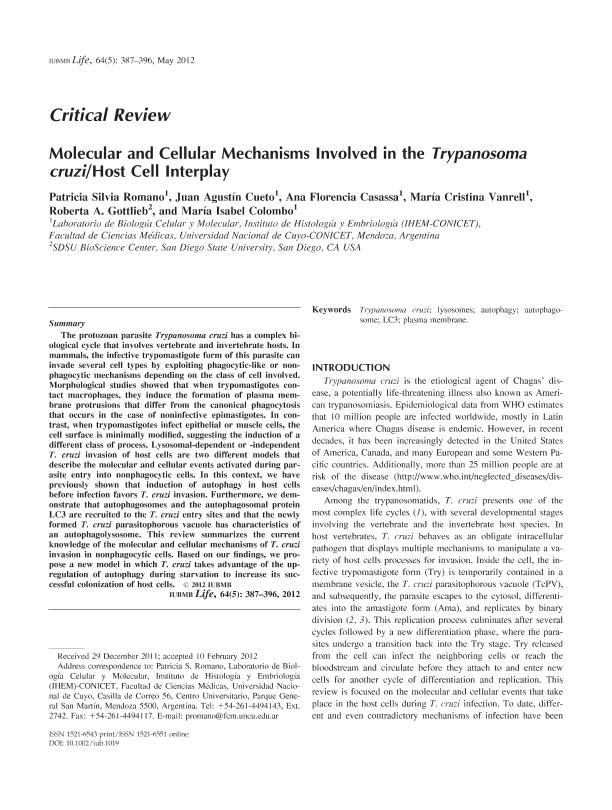Artículo
Molecular and cellular mechanisms involved in the Trypanosoma cruzi/host cell interplay
Romano, Patricia Silvia ; Cueto, Juan Agustin
; Cueto, Juan Agustin ; Casassa, Ana Florencia
; Casassa, Ana Florencia ; Vanrell, Maria Cristina
; Vanrell, Maria Cristina ; Gottlieb, Roberta A.; Colombo, Maria Isabel
; Gottlieb, Roberta A.; Colombo, Maria Isabel
 ; Cueto, Juan Agustin
; Cueto, Juan Agustin ; Casassa, Ana Florencia
; Casassa, Ana Florencia ; Vanrell, Maria Cristina
; Vanrell, Maria Cristina ; Gottlieb, Roberta A.; Colombo, Maria Isabel
; Gottlieb, Roberta A.; Colombo, Maria Isabel
Fecha de publicación:
05/2012
Editorial:
John Wiley & Sons Inc
Revista:
IUBMB Life
ISSN:
1521-6543
Idioma:
Inglés
Tipo de recurso:
Artículo publicado
Clasificación temática:
Resumen
The protozoan parasite Trypanosoma cruzi has a complex biological cycle that involves vertebrate and invertebrate hosts. In mammals, the infective trypomastigote form of this parasite can invade several cell types by exploiting phagocytic-like or non-phagocytic mechanisms depending on the class of cell involved. Morphological studies showed that when trypomastigotes contact macrophages, they induce the formation of plasma membrane protrusions that differ from the canonical phagocytosis that occurs in the case of noninfective epimastigotes. In contrast, when trypomastigotes infect epithelial or muscle cells, the cell surface is minimally modified, suggesting the induction of a different class of process. Lysosomal-dependent or -independent T. cruzi invasion of host cells are two different models that describe the molecular and cellular events activated during parasite entry into nonphagocytic cells. In this context, we have previously shown that induction of autophagy in host cells before infection favors T. cruzi invasion. Furthermore, we demonstrate that autophagosomes and the autophagosomal protein LC3 are recruited to the T. cruzi entry sites and that the newly formed T. cruzi parasitophorous vacuole has characteristics of an autophagolysosome. This review summarizes the current knowledge of the molecular and cellular mechanisms of T. cruzi invasion in nonphagocytic cells. Based on our findings, we propose a new model in which T. cruzi takes advantage of the upregulation of autophagy during starvation to increase its successful colonization of host cells.
Palabras clave:
AUTOPHAGOSOME
,
AUTOPHAGY
,
LC3
,
LYSOSOMES
,
PLASMA MEMBRANE
,
TRYPANOSOMA CRUZI
Archivos asociados
Licencia
Identificadores
Colecciones
Articulos(IHEM)
Articulos de INST. HISTOLOGIA Y EMBRIOLOGIA DE MEND DR.M.BURGOS
Articulos de INST. HISTOLOGIA Y EMBRIOLOGIA DE MEND DR.M.BURGOS
Citación
Romano, Patricia Silvia; Cueto, Juan Agustin; Casassa, Ana Florencia; Vanrell, Maria Cristina; Gottlieb, Roberta A.; et al.; Molecular and cellular mechanisms involved in the Trypanosoma cruzi/host cell interplay; John Wiley & Sons Inc; IUBMB Life; 64; 5; 5-2012; 387-396
Compartir
Altmétricas



